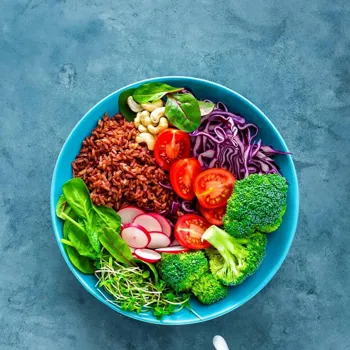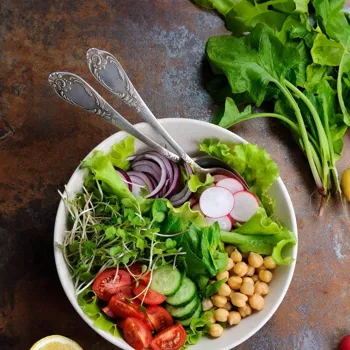Dive into the world of plant-based eating to discover its benefits and if it suits you. Are you ready to explore a healthier lifestyle? Read on!
In recent times, a lot of people are showing interest in plant-based
diets. You might have seen your colleagues bringing colourful salads for lunch, or maybe your family members are talking about "going vegan." But what exactly does "plant-based" mean, and is it really good for you?
Let's explore the good things about eating more plants and see if it's the right choice for your health and lifestyle.
Plant-based eating focuses on fruits, veggies, grains, legumes, nuts, seeds for meals
Plant-based eating isn't just about munching on raw vegetables all day. It's more about making plants the focus of your meals. This means loading up on fruits, vegetables, grains like rice and quinoa, legumes like beans and lentils, nuts, and seeds.
Some people who follow a plant-based diet might still eat small amounts of dairy products. Others might avoid animal products altogether. The main idea is to eat mostly foods that come from plants. It includes eating a variety of colorful fruits and vegetables every day.
Vegan
Avoids all animal products, including meat, dairy, eggs, and often honey.
Flexitarian
Primarily eats plant-based foods, but occasionally includes meat or other animal products.

Eating more plants benefits heart, weight, health with vitamins
Eating more plants has several benefits for your body. Firstly, it's great for your heart. Plant-based diets are usually low in saturated fat and cholesterol, which are not good for heart health. Studies have shown that people who eat mainly plants are less likely to have heart problems.
Secondly, plant-based diets can help you manage your weight. Plant foods are full of fibre, which makes you feel full for longer and can stop you from overeating. Plus, plant-based foods are often lower in calories than foods that come from animals.
Thirdly, plants are full of important vitamins and minerals, essential for good health.
Plant-based diets lower diabetes risk and boost overall health
Moreover, many studies indicate that people with plant-based diets have a lower risk of type 2 diabetes. The fibre in plant-based diets helps regulate blood sugar levels, reducing spikes and crashes.
Eating plenty of plant based foods is an excellent way to ensure that our body is getting sufficient nutrients for the daily functioning of our body. With more vitamins and minerals and less salt, cholesterol and sugar, the body feels a lot healthier.
Plant based foods are also known to have anti oxidants which fights toxic substances within the body.
Start small by swapping meat meals for plant-based options
Changing your diet can seem hard, but it doesn't have to be a big jump. Start small. Try swapping one meat-based meal a week for a vegetarian option. For example, have a lentil soup instead of chicken curry. Gradually increase the number of plant-based meals you eat each week.

Explore new recipes that feature plant-based ingredients too. There are plenty of resources online and in cookbooks with tasty vegetarian and vegan recipes. It is also useful to get a nutritionist’s opinion before starting on a plant-based diet.
Experiment with diverse grains and foods for a nutrient-rich diet
Experiment with different grains like quinoa, barley, and millet. These can be interesting substitutes for rice and give you a wider range of nutrients. Nuts and seeds are great for snacking and can add healthy protein and fats to your diet.
Try adding almonds, walnuts, or sunflower seeds to your breakfast cereal or salads. It is important to focus on eating a good variety of fruits and vegetables to ensure you are getting all the necessary vitamins and minerals.
Adding spices and herbs can make plant-based meals more flavorful and enjoyable. Trying different varieties of food from several cuisines can make the switch easier.
Key considerations before transitioning to a plant-based diet
Before you dive headfirst into a plant-based diet, there are a few things to consider. Make sure you're getting enough essential nutrients. Vitamin B12 can be harder to get from plant-based sources, so you might need to take a supplement or eat fortified foods.
Iron, calcium, and omega-3 fatty acids are other important nutrients that you need to ensure you are receiving enough of.
Consulting a doctor or registered dietitian is really helpful to determine whether this is a suitable choice for you, and to make adjustments to fulfill all of your nutritional needs.
Plan ahead for balanced plant-based meals; read labels, consult doctor
When following a plant-based diet, remember to plan your meals ahead. This will ensure that you have everything to make healthy and balanced meals. Also, read food labels so you know what you’re putting into your body.
Sometimes, processed plant-based foods can be high in sugar, salt, or unhealthy fats. It is also good to consult a doctor before adopting any diet plans as some fruits/vegetable may conflict with medical conditions or prescriptions.
Eating a balanced meal with food from all necessary food groups is important.
Indian plant-based diet rich in tradition & nutrients, watch iron intake
India has a long history of vegetarianism, so plant-based eating isn't a new concept. Many traditional Indian dishes are naturally vegetarian and provide essential nutrients. Dishes like dal (lentil soup), chana masala (chickpea curry), and vegetable biryani are delicious and nutritious options.
However, it's important to ensure that your plant-based Indian diet is well-balanced and provides all the nutrients your body needs. For instance, you may need to pay attention to iron intake, as it is more easily absorbed from animal products.
Indian cuisine rich in lentils, spices, dairy; shift may be challenging; fresh, local ingredients
Indian cuisine is naturally rich in lentils and legumes, and provides for the protein and iron requirements of the body. Variety of Indian spices like turmeric also have immense health benefits.
Dairy is considered an integral part of Indian diet, be it for making ghee or curd, so the shift might be difficult for some. Indians often have a preference for freshly cooked meal and a lot of local fruits, vegetables and grains make it a healthy and delicious meal.
While shifting, taking the opinions of family members can also be helpful to make the change smoother.
Personal choice to adopt plant-based diet for health benefits
Ultimately, the decision to try a plant-based diet is a personal one. It's about what works best for your body, your lifestyle, and your values. If you're thinking about switching, start by making small changes. Pay attention to how your body feels and adjust your diet accordingly.
Whether you go fully vegan or simply eat more plant-based meals, incorporating more plants into your diet can have significant health benefits. Remember to consult a healthcare professional or registered dietitian for personalized guidance.
Plant-based diet offers health benefits and helps the environment
Plant-based diet can provide a variety of health benefits, including improved heart health, better weight management, and a reduced risk of chronic diseases. It can be good for the environment as well.
By reducing consumption of packaged foods and animal products, it can potentially reduce one’s carbon footprint as well. Remember to focus on eating a variety of whole, unprocessed plant foods to get the most benefits.
So, consider giving plant-based foods a try; this might be the way to a healthier and happier you!
AI Generated Content. Glance/InMobi shall have no liability for the content











